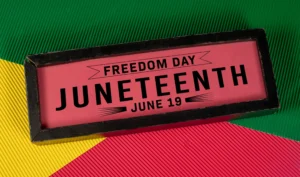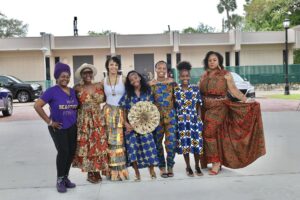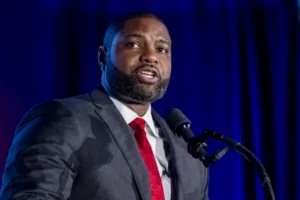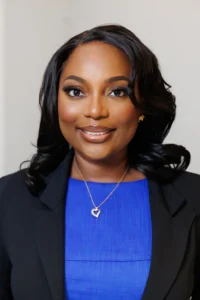The Joy of Juneteenth: a Day of Reflection and Renewal
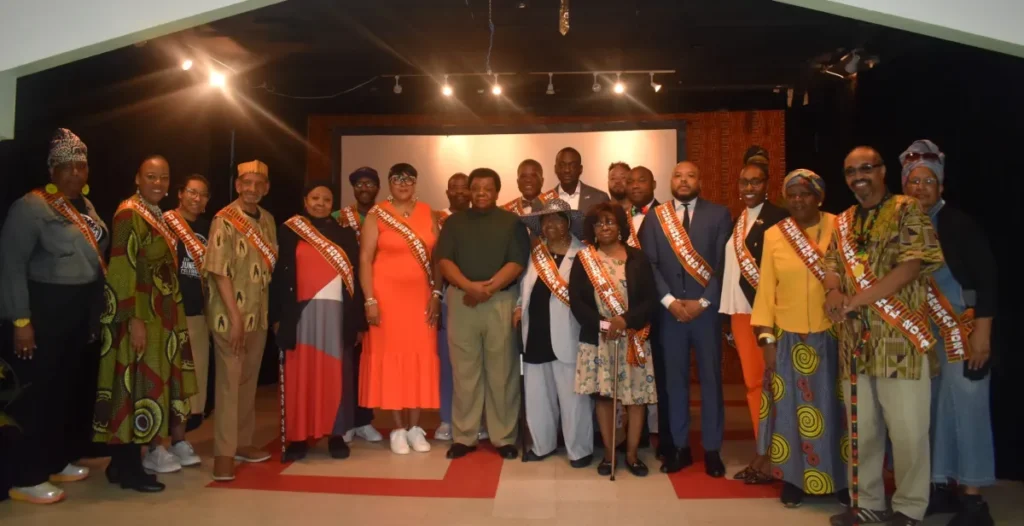
by ARIAMA C. LONG Report for America Corps Member / Amsterdam News Staff
Juneteenth, the celebration of the emancipation of enslaved Africans and their descendants on June 19, 1865, in Texas, was almost a lost date in American history. Today, it is a festive nationwide holiday rooted in elevating the ideas of Black American freedom.
While the rest of the nation catches up, the historic Masjid Malcolm Shabazz on West 116th Street in Harlem has been celebrating Juneteenth for more than 30 years. Founded in 1956 by the Honorable Elijah Muhammad and civil rights icon Malcolm X, the Masjid’s Juneteenth Committee has strived to keep history alive with an annual honorary breakfast, community parade, and all-day street festival with local vendors.
This year’s breakfast, held in the basement level of the masjid, kicked off with a solemn Arabic prayer. After a round of short speeches, the Grand Marshals of the Juneteenth parade and honored guests enjoyed hearty helpings of fried whiting, grits, eggs, coffee, and donuts.
“We are glad again that we can gather in such great spirit for this celebration of dignity— celebration of recognition that we were always free,” said Imam Izak-El Pasha, who heads the mosque portion of the organization. “No matter what was done to us, the efforts to enslave a human soul are a waste of time because God created that soul to be free and no man can capture it from ignorance and stupidity and fear.”
Because of the racial reckoning that was the Black Lives Matter movement in 2020, Juneteenth became a statewide holiday in New York under former Governor Andrew Cuomo. A year later, President Joe Biden signed the Juneteenth National Independence Day Act, which officially made Juneteenth a federal holiday. Finally, in 2022, New York City Mayor Eric Adams designated Juneteenth as a paid city holiday.
This year’s Grand Marshals are local Harlem heroes such as Amsterdam News photographer Bill Moore, Senator Cordell Cleare, Councilmember Yusef Salaam, Judge J. Machelle Sweeting, director of civic engagement for Central Park Conservancy Shatic Mitchell, Meet Me at the Crosswords Founder Diane Anderson, Restaurateur Charles Gabriel, Dr. Lena L. Green, and Make My Cake Founder Joanne Baylor. Many reflected on what Juneteenth means to them.
“This is very exciting to me,” said Cleare. “I’ve marched with this parade since its inception 31 years ago. And today it’s different, as it has been for the past three years, because now it’s a holiday. The [Juneteenth] Committee not only fought to have this parade; they advocated to make this a holiday. This is a double victory. All the years we’ve been educating. Now everybody knows, everybody’s celebrating, and we couldn’t be more proud to have that happen in the village of Harlem.”
Salaam’s remarks focused more on the vision he has for the future of Harlem’s community. “We’ve been waylaid in the melee, and so here we are, stumbling forward, trying to repair ourselves. We deal with the oversaturation, overburden, and divestment that has been plaguing our community not just yesterday, but in some cases, decades,” said Salaam. “There is no one coming for us. There is no savior, therefore we have to save ourselves.”
The parade began shortly after breakfast. The day was hot and bright in Harlem, beckoning joy and cheer. Giant floats and raucous bands, decked out in Juneteenth colors and banners, left from W. 116th Street and Malcolm X Blvd., traveled to Frederick Douglass Blvd. and across W. 125th Street, and then back down Malcolm X Blvd. to culminate where the street festival was. Bringing up the rear of the parade were cure violence interrupters from Harlem’s Street Corner Resources and a fleet of Ruff Ryder motorcycles and bicycle riders.
“It’s just an honor. I’m very, very appreciative of everybody who made this possible,” said Moore, who’s been working as a photographer and documenting Harlem for the last 45 years.
At the festival, dozens of Black, Caribbean, and African vendors sold their wares in the middle of W. 116th Street. Children and youth mentors held hula hoop, basketball, and double-dutch competitions towards the back. Local poets, singers, and rappers graced the mainstage with colorful and moving performances.
“It’s a reminder and a reflection that while there are many freedoms that African Americans can now enjoy, it’s important that we remain steadfast in our commitment to uplift the new generation, empower their rights, and also inform them about their history,” said Sweeting. “That’s what this celebration is all about.”


